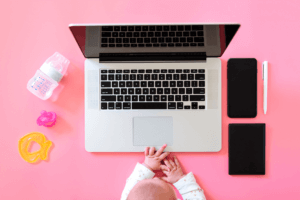Why are we still embarrassed to speak openly about periods? They affect approximately 50% of the total population. Every day we are likely to encounter women who are experiencing hormonal fluctuations due to menstruation, ovulation, pregnancy, menopause, or at any point in between.
The CIPD (the UK’s professional body for HR and people development) recently reported 87% of people who menstruate have experienced stress or anxiety in the workplace because of their period. That’s astonishing! 87%.
If we are truly striving for gender inclusion, equality and fairness, we need to address this silent issue and make our voices heard. If there was any other issue negatively impacting on the workforce to this significantly high level, we would be shouting from the rooftops and demanding action. So why haven’t we? And, why aren’t we doing more to address workplace stress and anxiety for women who are menstruating?
On top of this, women also have to deal with unpredictable symptoms of menopause which is hugely underreported on and often ignored. Yet, brain health experts have recently discovered that women’s brains go through significant change when they experience hormonal fluctuations, e.g., puberty, pregnancy and menopause. Their brains are hugely affected by the change in hormones – having an impact on memory, focus and cognitive ability. Yes, brain fog is a real thing!
Vodafone conducted a global survey across their employees which reported ‘a third of women who have suffered symptoms of the menopause say they hid them at work’. Another report by the CIPD found three out of five working people experiencing menopausal symptoms say it has a negative impact on them at work. These are shocking statistics.
With more women in the workforce, more women remaining at work for longer and an [attempted] increase in female leaders, let’s start to make a difference and address these real issues facing all women throughout their working lives.
Let’s address women’s health at work.
How to start…
If you don’t already have a menopause policy, it’s time to get one. Find out what women need to feel more relaxed at work during these changes in their lives (NB., hormonal changes affect women at different ages, no one size fits all in regard to age so be as inclusive as possible & do not determine anything by age). Well done to companies like Vodafone, Publicis and the UKs Channel 4 for leading the way with their menopause policies.
Ask
Ask what the women in your organisation need and want. On a personal note, please do not just ask one person, get a variety of people to make a contribution to this. My mum never understood how much pain I was in on a monthly basis because she never had heavy or painful periods, that can be debilitating. However, when she went through menopause she finally understood. Every woman is different, and your policies and / or behaviours need to be flexible and adaptable for all women.
Flexible Working
Allow flexible working arrangements as and when they’re required – including last minute ‘working from home’ opportunities. Feeling anxious about leakage, pain or bloating mean some women need to sit with a hot water bottle and just be in comfortable clothing for a few days; this can help them focus on their work without feeling this additional stress of being in the office. The number of times I sat through meetings, overcome with pain, feeling like I would pass out and not able to concentrate or contribute – sweating but also shaking in severe pain and discomfort. It’s so incredibly sapping. Having the ability to just say, I can’t be in the office today, would have been hugely beneficial to me and also on my effectiveness at work on these days.
In the office (when we go back!)
Make fans available. I know some women get hot flushes with a race of hormones, so make fans or desks near open windows available to women when they need it (or permanently if required).
Provide space – a room that’s quiet, with relaxed seating options – available for women when they are in pain or just need to have a private space to manage their symptoms. Other body systems, such as gastrointestinal and urinary systems may be impacted by normal hormonal fluctuations, this is uncomfortable and can be really embarrassing at work.
Have sanitary products available – some months your cycle is just out of kilter, and for women who are getting their cycle back after a baby, experiencing increased stress or recovering from serious illness, or those going through menopause our cycle just isn’t as regular for some time. It just arrives some months like the unwelcomed visitor that it is. I have been caught out; it’s very frustrating and stressful. So, make sanitary items available for women when they need them, it would be great if they were free at work, just in the bathroom in case of emergency (and restocked too).
Always…
Change/Have the conversation out loud – let’s normalise women’s hormonal health and let’s talk about menstruation, menopause, pregnancy, post-natal hormonal changes – all of these affect women. We all know other women, be they our mothers, grandmothers, daughters, sisters, aunties, colleagues and friends. Don’t be silent; it affects all people born with female specific organs, including those who may not identify as female, which can make these issues even more difficult to manage.
Be compassionate. Women go through a range of hormones every month. These affect their sleep, their mood and their mental health. Every. Single. Month. So please, be compassionate towards women, find out what is needed at your workplace to empower women to feel more productive when they are experiencing hormonal changes.
Just think about how you can make it less stressful and reduce anxieties of women when they are going through all of these natural hormonal cycles.
If you’re truly being inclusive, be inclusive of women, as they are, as they always have been and do something that will create an improved experience for women to flourish every day and not just for some of the month.
If you want to learn more about how to improve wellbeing for all, get in touch, we provide a variety of wellbeing packages as well as developing tailored wellbeing strategies – bernadette@rosbyconsulting.com




